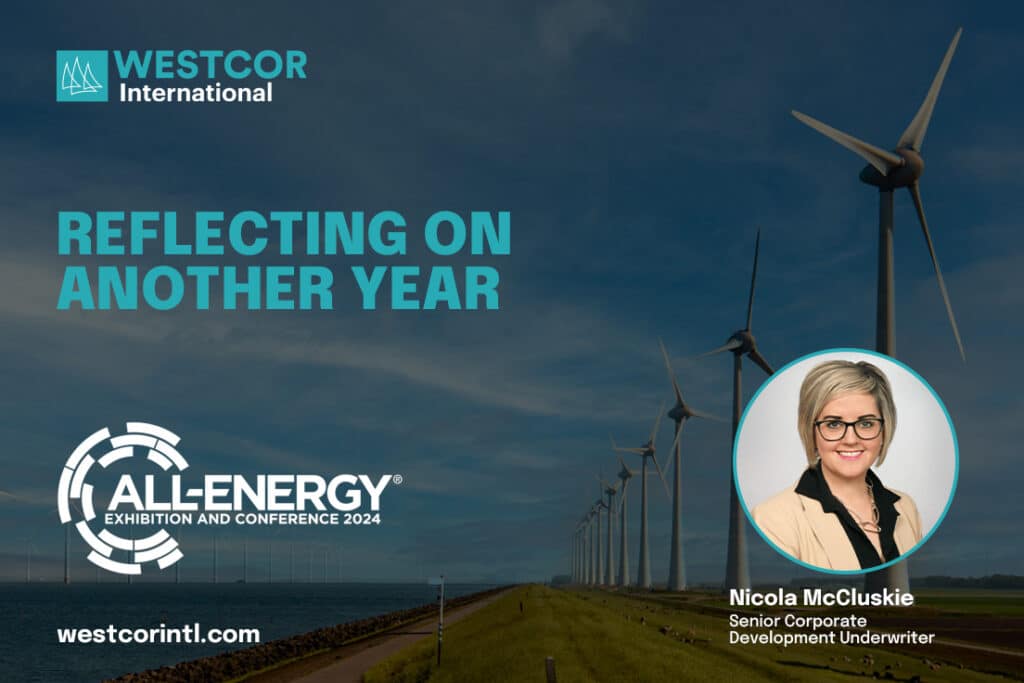All-Energy 2024: Reflecting on Another Year
by Nicola McCluskie, Senior Corporate Development Underwriter and Solicitor
All-Energy continues to grow and improve each year, and the recent 2024 event in Glasgow was no exception. Thousands gathered to discuss the current climate emergency and to showcase innovative technologies and projects. This year’s event also coincided with Glasgow’s first ever Climate Week which is an exciting new event originating from COP26.
As expected, the political challenges were a hot topic, with passionate views expressed right from the opening plenary session, which highlights just how important the race to Net Zero is for Scotland and its people.
The event highlighted some exciting developments, here are my key takeaways…
The Scottish Government’s Position
Màiri McAllan’s commitment to leading Scotland in the race to Net Zero was clear. She emphasised that failing to address the global climate emergency could have existential consequences. Contrary to the belief that the Net Zero race and economic growth are mutually exclusive, Mairi highlighted that between 1990 and 2021, greenhouse emissions have halved, whilst the economy grew by about 56%.
Màiri also championed several advancements in Scotland’s renewable energy sector:
- 25.9 GW of energy generation in the planning pipeline
- A pipeline of 40GW for offshore wind projects as a result of Scotwind
- The establishment of the Scottish Offshore Wind Port’s Alliance
- The opening of the Sumitomo Electric Industries factory at the Port of Nigg
- RWE’s announcement of the first phase of its large scale, green hydrogen plant at Grangemouth.
Additionally, a new £1.5m pilot fund is being launched through CARES to help local communities create their own energy projects.
For those of us immersed in the Scottish energy sector, the months and years ahead promise to be busy!
Onshore Wind Sector Deal
Despite being a ground-breaking initiative, progress has been slower than the stakeholders had hoped, largely due to resource constraints. With 63 commitments forming part of the Sector Deal, there is still much to be done, and the sector is currently behind schedule.
Planning delays remain a concern. With an ambitious target of delivering 15-16GW by 2030 (to reach a total of 20GW by 2030), the Energy Consents Unit’s current pace of delivering circa 17 decisions per year may not be sufficient, despite the Sector Deal’s pledge to halve planning decision timescales.
Supply Chain
Scotland, despite its leading position in the global energy sector, faces a significant skills shortage. The workforce potentially needs to triple between 2024 to 2027 to meet the ambitious targets and fulfil the country’s potential. Urgent action is needed to address this.
Infrastructure
Scotland is leading the charge on port investment which will be crucial for linking offshore projects to onshore technologies like hydrogen, accelerating the race to Net Zero.
The Forth Green Freeport represents a significant opportunity for Scotland, promising investment, employment, international trade and export capability. This initiative will help Scotland become a market leader in renewable energy, alongside the proposed RWE green hydrogen plant, which marks a step closer to decarbonisation and moving away from oil and gas.
Investment
Attracting investment to Scotland requires more effort. Although the Scottish energy market is seen as a “low risk” investment, developers cannot take this for granted. There needs to be more stimulation and certainty, with the current energy market reform process hopefully addressing these needs. The next Contracts for Difference round will also be crucial.
To achieve current targets, investment in grid connection is key to support the vast array of projects Scotland has to offer.
Conclusions
There is much to be excited about in Scotland’s energy sector, and the conference buzz reflected this optimism. The message is clear, Scotland is open for business and leading in this sector.
However, the conference also highlighted the significant work that remains. Collaboration among all stakeholders is crucial. Governments need to work together to address issues such as supply chain, investment, planning and grid infrastructure. These are critical for developing key projects and infrastructure. Collaboration at national and international levels is essential.
This all sits against the backdrop of the Scottish Government adjusting their key 2030 climate target, which remains the industry’s benchmark.
To deliver Scotland’s potential, everyone involved must ensure that they are moving swiftly in the race to Net Zero, which is more of a marathon than a sprint.
As always, title insurance will play a crucial role in facilitating these projects, by addressing land title issues and placating buyers, investors, and lenders. The team at Westcor is very much a part of this race!






